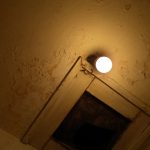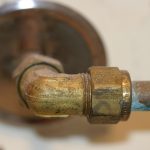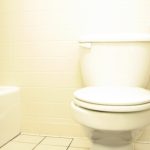If you live in a home with low water pressure problems, it can have a dramatic effect on your life. This is especially apparent when you’re showering, it’s especially hard to rinse soap away, and it’s also noticeable in other areas in your home. Water using appliances may take longer to fill, the cleaning cycles may be longer and the water supplied to your faucets could be reduced to a dribble. This is frustrating, and it’s an inefficient use of water and energy at the same time. In this article, we will take a look at some common causes of low water pressure problems and some helpful advice on how to restore adequate water pressure to your home.
Municipal Water Valve Issues
If your home is connected to a municipal city water supply, there will be a pair of important valves that you need to be aware of. The first valve is located outside, it will be at street level, and it’s usually next to your water meter. The second valve could be inside or outside your home, this is the main water shut-off valve, and it’s often located near your water heater.
If one or both of these valves is partially closed, you may notice that your water pressure is lower than it should be. This is an uncommon problem, but if you have a sudden change in your water pressure, it’s worth investigating these two valves.
The municipality operates the water meter valve. If any repairs or utility work has been carried out in your neighborhood recently and the water pressure drops that could be the cause. If this is not the case, make sure that the water shut-off valve is fully open to eliminate that as a possible cause.
The Pressure Regulator Valve
Some homes have a different type of valve fitted, this is known as a pressure regulator, and it’s installed to lower water pressure. If the water coming into the home has an excessively high water pressure, it can create a number of problems. Plumbing pipes and fixtures are put under considerable strain, and this can lead to leaks and burst pipes. Any water using appliances can easily be damaged, and a plumbing expert will recommend a pressure regulator to fix the problem.
If you have a pressure regulator installed in your home and it fails there could be a sudden decrease or increase in water pressure. A pressure regulator can fail when sediment has built up in the valve, and this can lead to short cycling issues, pump problems and blockages in the plumbing system.
If you suspect that the pressure regulator is the source of your water pressure issues, it’s a good idea to contact a
local certified plumbing professional. The valve may still be working, but it could need adjustment to meet the water pressure demands for your home. As an example: you may notice that you cannot get good water pressure for showering if the washing machine is running at the same time. These types of water pressure demand issues can be related to your pressure regulator.
Clogged Plumbing Pipes
Plumbing pipes can become clogged by dissolved minerals found in hard water supplies. Over time, a thin film of water hardening minerals, such as calcium, magnesium, and iron will develop and then it will gradually form into scale. As the scale gets thick, the diameter of the plumbing pipe will decrease, the flow of water and the water pressure will be decreased. Hard water issues can be solved with a water softener, but the accumulated scale in your plumbing pipes will remain. A local certified plumber will be able to assess the extent of the problem, some repairs or even a pipe replacement may be needed to restore your water pressure.
Clogged Faucets and Fixtures
If you notice that your water pressure problems are isolated to specific faucets and/or fixtures, there could be clogs or corrosion located there. This is often simple to fix; shower heads can be cleaned to get rid of the scale, and the aerators in your faucet are easy to replace. But, it’s important to realize that this will probably be a temporary fix at best and the underlying causes have not been dealt with. Eventually, the problem will resurface, and this is probably due to the build-up of scale from hard water as discussed above. If you want to get rid of this problem for good, it will be necessary to install a water softener in your home.
Corroded Plumbing Pipes
If you have older galvanized iron plumbing pipes, they can be clogged with scale, and they are also vulnerable to restriction due to corrosion. If your water has a low pH level, it’s too acidic, and if the pH level is too high, it’s too alkaline. Water that’s too acidic or alkaline can corrode iron galvanized iron pipes and even copper pipes can be corroded by water that’s too alkaline. If there are elevated levels of dissolved oxygen, total dissolved solids (TDS), sediment and sand, and sulfates or iron bacteria, present this can cause wear and tear on your plumbing pipes that can lead to corrosion. If you have higher water temperatures, the corrosion risk also increases and that’s why some people notice a drop in water pressure when they use hot water.
Water Heater Issues
When you’re trying to diagnose the cause of low water pressure, the water heater is a good place to investigate. If you notice the water pressure is reduced when you use hot water your water heater could be struggling to meet your demands. Again, this could be caused by a build-up of scale inside your water heater pipes, and this is restricting the water flow in and out of the unit. In some cases, the damage can be repaired, but it’s far more likely that the water heater will need to be replaced. This will not fix the underlying hard water issues, and a water softener may be required.
By Giovanni Longo President Flood Brothers Plumbing
Giovanni Longo is a 3rd generation master plumber who has been practicing his craft and trade in the greater Los Angeles area for well over a decade and a half. A plumbing and hydraulics-engineering innovator, Giovanni’s particular world-class expertise focuses on dealing with challenging sewer system designs as well as resolving complex commercial and residential draining issues. As a certified Flood Mitigation expert, he is also well versed in a wide variety of water damage and remediation solution.





